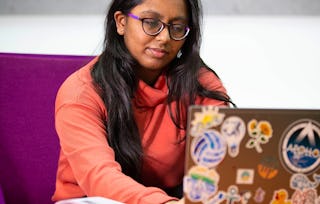Erweitern Sie Ihre Statistik- und Wahrscheinlichkeitskenntnisse mit diesem Kurzkurs der University of Leeds. In der ersten Woche werden Sie in die Statistik als die Kunst und Wissenschaft des Lernens aus Daten eingeführt. Anhand zahlreicher Beispiele aus der Praxis erkunden Sie die Unterschiede zwischen Daten und Informationen und entdecken die Notwendigkeit statistischer Modelle, um objektive und zuverlässige Schlussfolgerungen zu ziehen. Sie werden sich mit der Bedeutung einer "unvoreingenommenen" Datenerhebung auseinandersetzen und über die Rolle der Randomisierung nachdenken. Die Untersuchung verschiedener Beispiele für die falsche Darstellung von Daten, für falsche Vorstellungen oder für unvollständige Daten wird Ihnen helfen, Ihr statistisches Gespür und Ihre Fähigkeiten in der Praxis zu entwickeln, einschließlich Peer-Review. In der zweiten Woche werden Sie R-Softwarekenntnisse in RStudio für die explorative Datenanalyse erlernen und üben, um grafische und numerische Zusammenfassungen zu erstellen. In der letzten Woche werden Sie Wahrscheinlichkeitsexperimente und Computersimulationen von Binomialversuchen durchführen, wie z. B. das Werfen einer Münze oder eines Würfels. Dies wird Ihnen helfen, ein intuitives Konzept der Wahrscheinlichkeit zu entwickeln, das sowohl die frequentistische als auch die subjektive Perspektive umfasst. Während des gesamten Kurses werden Sie wichtige statistische Fähigkeiten erwerben, indem Sie Techniken und Softwarebefehle üben und sich an Diskussionen mit Kommilitonen beteiligen. Am Ende des Kurses werden Sie in der Lage sein: - die Rolle statistischer Modelle beim Ziehen von Schlüssen aus Daten zu verstehen und zu erklären; - geeignete Werkzeuge für numerische und grafische Zusammenfassungen mit RStudio zu implementieren und die Ergebnisse zu interpretieren.

Statistische Methoden

10 reviews
Empfohlene Erfahrung
Was Sie lernen werden
Die Rolle der Statistik bei der Datenanalyse
R-Software mit RStudio zur Erstellung numerischer und grafischer Zusammenfassungen
Wie man einfache Wahrscheinlichkeitsexperimente und Computersimulationen durchführt
Kompetenzen, die Sie erwerben
- Kategorie: Wahrscheinlichkeitsverteilung
- Kategorie: Simulationen
- Kategorie: Statistische Methoden
- Kategorie: Wahrscheinlichkeit
- Kategorie: Statistische Analyse
- Kategorie: Stichproben (Statistik)
- Kategorie: Explorative Datenanalyse
- Kategorie: Deskriptive Statistik
- Kategorie: Statistische Inferenz
- Kategorie: Statistische Modellierung
- Kategorie: R (Software)
- Kategorie: Statistische Visualisierung
- Kategorie: Datenvisualisierungssoftware
- Kategorie: Datenanalyse
- Kategorie: Erhebung von Daten
Wichtige Details

Zu Ihrem LinkedIn-Profil hinzufügen
3 Aufgaben
Erfahren Sie, wie Mitarbeiter führender Unternehmen gefragte Kompetenzen erwerben.

In diesem Kurs gibt es 3 Module
Diese erste Woche führt Sie in die Statistik als die Kunst und Wissenschaft des Lernens aus Daten ein. Sie werden lernen, den Unterschied zwischen Daten und Informationen zu erkennen und begreifen, dass statistische Modelle notwendig sind, um objektive und zuverlässige Schlussfolgerungen zu ziehen. Sie werden Beispiele von Datensätzen betrachten und über geeignete Forschungsfragen nachdenken, die anhand dieser Daten gestellt und beantwortet werden können. Sie erkennen die Bedeutung einer "unvoreingenommenen" Datenerhebung und lernen die Randomisierung als Instrument zur Erreichung dieses Ziels kennen. Verschiedene Beispiele für die falsche Darstellung von Daten, falsche Vorstellungen oder Unvollständigkeit helfen Ihnen, statistisches Gespür und gute praktische Fähigkeiten zu entwickeln. Im Abschnitt "Aktivitäten" werden Sie mit dem Peer-Review-Tool vertraut gemacht, mit dem Sie Ihre Fähigkeiten zur statistischen Datenanalyse verbessern können.
Das ist alles enthalten
1 Video14 Lektüren1 Aufgabe2 Diskussionsthemen
In Woche 2 haben Sie die Möglichkeit, Ihre R-Kenntnisse in der explorativen Datenanalyse zu erlernen und zu üben, indem Sie numerische und grafische Zusammenfassungen einer Vielzahl von Datensätzen erstellen. Sie lernen, zwischen verschiedenen Datentypen zu unterscheiden (kategorisch vs. numerisch) und geeignete numerische und grafische Zusammenfassungen zu verwenden. Sie sammeln auch Erfahrung in der Unterscheidung zwischen "normalen" und schiefen Daten unter Verwendung von Box-Plots und Histogrammen. In dieser Woche steht eine umfangreiche Aufgabe in RStudio zur Bearbeitung an.
Das ist alles enthalten
1 Video10 Lektüren1 Aufgabe1 Diskussionsthema1 Unbewertetes Labor
In dieser letzten Woche haben Sie die Möglichkeit, eine bemerkenswerte Stabilität von Frequenzen als experimentelle Unterstützung des Konzepts der Wahrscheinlichkeit zu untersuchen. Sie wenden Ihre R-Kenntnisse an und führen Computersimulationen von wiederholten Zufallsversuchen durch (z. B. Werfen einer Münze oder Würfeln). Auf der Basis dieser Beobachtungen entwickeln Sie ein intuitives Konzept der Wahrscheinlichkeit (frequentistisch und subjektiv). Sie tauschen Ihre Ergebnisse in einem Diskussionsforum aus, um Langzeitexperimente zu erörtern, mit denen Sie die Wahrscheinlichkeit verschiedener interessanter Ereignisse "messen" können (z. B. lange Serien von 6er-Würfen oder gleiche Geburtstage in einer Schulklasse).
Das ist alles enthalten
1 Video6 Lektüren1 Aufgabe1 Diskussionsthema1 Unbewertetes Labor
Bereiten Sie sich auf einen Abschluss vor.
Wenn Sie Kurs von University of Leeds absolvieren, erhalten Sie möglicherweise eine Vorschau der Themen, Materialien und Lehrkräfte für einen verwandten Studiengang. So können Sie besser einschätzen, ob das Thema oder die Universität die richtige Wahl für Sie wäre.
Dozent

Mehr von Wahrscheinlichkeitsrechnung und Statistik entdecken
 Status: Vorschau
Status: VorschauO.P. Jindal Global University
 Status: Kostenloser Testzeitraum
Status: Kostenloser TestzeitraumIllinois Tech
 Status: Vorschau
Status: VorschauUniversity of Leeds
 Status: Kostenloser Testzeitraum
Status: Kostenloser TestzeitraumJohns Hopkins University
Warum entscheiden sich Menschen für Coursera für ihre Karriere?

Felipe M.

Jennifer J.

Larry W.

Chaitanya A.
Bewertungen von Lernenden
- 5 stars
80 %
- 4 stars
20 %
- 3 stars
0 %
- 2 stars
0 %
- 1 star
0 %
Zeigt 3 von 10 an
Geprüft am 19. Aug. 2024
Few videos - but that's fine - and plenty of hands-on R, also fine. Less talking head and more participation is great. A short course, I would have liked longer.

Neue Karrieremöglichkeiten mit Coursera Plus
Unbegrenzter Zugang zu 10,000+ Weltklasse-Kursen, praktischen Projekten und berufsqualifizierenden Zertifikatsprogrammen - alles in Ihrem Abonnement enthalten
Bringen Sie Ihre Karriere mit einem Online-Abschluss voran.
Erwerben Sie einen Abschluss von erstklassigen Universitäten – 100 % online
Schließen Sie sich mehr als 3.400 Unternehmen in aller Welt an, die sich für Coursera for Business entschieden haben.
Schulen Sie Ihre Mitarbeiter*innen, um sich in der digitalen Wirtschaft zu behaupten.
Häufig gestellte Fragen
Dieser Kurs ist ein Schnupperkurs zum MSc Datenwissenschaft (Statik) auf Coursera. Der Abschluss des Kurses führt nicht zu einer Anrechnung auf dieses Programm. Der Kurs kann von allen Lernenden, die am Programmieren und am Erlernen der Grundlagen von Python interessiert sind, unabhängig absolviert werden.
Um Zugang zu den Kursmaterialien und Aufgaben zu erhalten und um ein Zertifikat zu erwerben, müssen Sie die Zertifikatserfahrung erwerben, wenn Sie sich für einen Kurs anmelden. Sie können stattdessen eine kostenlose Testversion ausprobieren oder finanzielle Unterstützung beantragen. Der Kurs kann stattdessen die Option "Vollständiger Kurs, kein Zertifikat" anbieten. Mit dieser Option können Sie alle Kursmaterialien einsehen, die erforderlichen Bewertungen abgeben und eine Abschlussnote erhalten. Dies bedeutet auch, dass Sie kein Zertifikat erwerben können.
Wenn Sie ein Zertifikat erwerben, erhalten Sie Zugang zu allen Kursmaterialien, einschließlich der benoteten Aufgaben. Nach Abschluss des Kurses wird Ihr elektronisches Zertifikat zu Ihrer Erfolgsseite hinzugefügt - von dort aus können Sie Ihr Zertifikat ausdrucken oder zu Ihrem LinkedIn-Profil hinzufügen.
Weitere Fragen
Finanzielle Unterstützung verfügbar,

